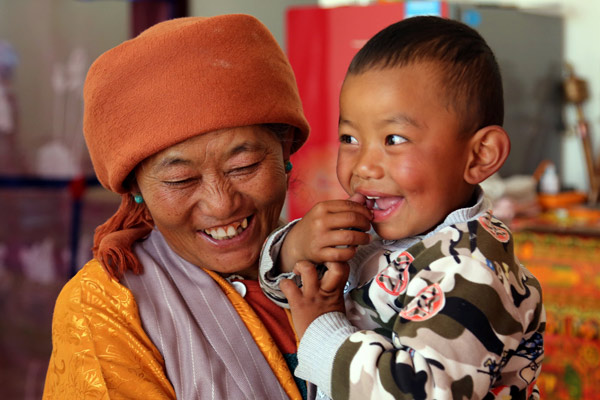Bringing new hope to poorest people on plateau
China Daily, November 29, 2016 Adjust font size:

Dashon hugs her grandson at her new house in Sanyou village near Lhasa.[Photo by Daqiong/China Daily]
"We have been trying to set a good example and introduce them to good programs, but those with the initiative to improve their own lives have probably already done so," he said.
Development goals
The regional government has set the goal of eradicating poverty by 2020. During the next five years, it plans to invest 18 billion yuan ($2.5 billion) in 1,216 development programs, most of which are designed to provide employment opportunities for the less well-off or help them to establish cooperatives.
Meanwhile, the authorities will move about 236,000 impoverished people into resettlement projects, and a loan of more than 38 billion yuan has been obtained to finance the process.
The new dwellings have been well-received by many villagers. In Lhasa's Quxu county, the local authorities have relocated 172 households to Sanyou village, where they live in newly built two-story houses that were fully furnished long before the occupants arrived.
Dashon, a 52-year-old resident, said that in the past she and her family had to shelter in a neighbor's house whenever it rained.
"Our house could have collapsed at any minute, and we often feared for our safety," she said.
Sonam Dekyi, a government official in Sanyou, said villagers vote to determine which families will be allowed to move into the new settlement.
"We constantly remind them that moving here is the start of their new lives. They should not be satisfied with the status quo," she said.
In the coming five years, the regional authorities will also provide part-time jobs, such as forest ranger posts, for 500,000 people.
Lu Huadong, deputy head of the Tibet poverty alleviation office, said the government has now entered the personal details of 590,000 officially designated poverty-stricken people in its archives.
"We have identified 11 different factors that help to explain why these people live in poverty, and different measures will be adopted for different people and different households to help lift them out of poverty," he said.
Penpa, a 48-year-old resident of Bayi township in Nyingchi, described himself as being "weak as a hen" after a long-term stomach ailment. He spends about 10,000 yuan on medical bills every year, and has a 70,000 yuan mortgage after building a new house in 2014 to replace the wood cabin he shared with his wife.
However, because he chose private clinics over public hospitals he has waived his right to claim medical insurance.
With the help of the authorities, Penpa and eight other villagers set up a cooperative to raise Tibetan chickens.
"We're desperately poor, but I definitely don't want to stay this way," he said.